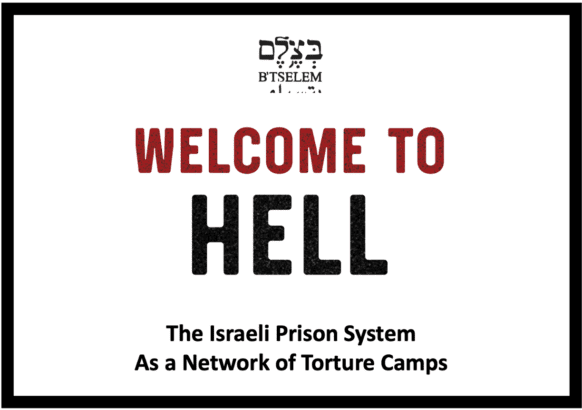Executive summary reposted from B’Tselem, the Israeli information center for human rights in the Occupied Territories
When we got off the bus, a soldier said to us, “Welcome to hell.”
– From the testimony of Fouad Hassan, 45, a father of five and resident of Qusrah in Nablus District. Read the full testimony here.
This report concerns the treatment of Palestinian prisoners and the inhuman conditions they have been subjected to in Israeli prisons since October 7, 2023. B’Tselem’s research for the report included collecting testimonies from 55 Palestinians who were incarcerated in Israeli prisons and detention centers during this time.
Thirty of the witnesses are residents of the West Bank including East Jerusalem, 21 are residents of the Gaza Strip, and 4 are residents of Israel.
The testimonies of the witnesses were given to B’Tselem after they were released from prison, the overwhelming majority of them without being tried.
The testimonies indicate a systemic institutional policy focused on the continual abuse and torture of all Palestinian prisoners held by Israel.
Frequent acts of severe, arbitrary violence, sexual assault, humiliation and degradation, deliberate starvation, forced unhygienic conditions, sleep deprivation, prohibition on and punitive measures for, religious worship; confiscation of all communal and personal belongings; and denial of adequate medical treatment – these descriptions appear time and again in the testimonies in horrifying detail and with chilling similarities.
Over the years, Israel has incarcerated hundreds of thousands of Palestinians in its prisons, which have always served, above all, as a tool for oppressing and controlling the Palestinian population.
The stories presented in this report are the story of thousands of Palestinians, residents of the Occupied Territories and citizens of Israel, who have been arrested since the beginning of the war, as well as Palestinians already incarcerated on 7 October who experienced the massive increase in hostility from prison authorities since that day.
In early July 2024, there were 9,623 Palestinians held in Israeli prisons and detention facilities, almost double the number just before the war began. Of these, 4,781 were detained without trial, without being presented with the allegations against them, and without access to the right to defend themselves, in what Israel terms “administrative detention.”
Some were jailed simply for expressing sympathy for the suffering of Palestinians. Others were taken into custody during military activity in the Gaza Strip, on the sole grounds that they came under the vague definition of “men of fighting age.” Some were imprisoned over suspicions, substantiated or not, that they were operatives or supporters of Palestinian armed groups.
The prisoners form a wide spectrum of people from different areas, with varying political opinions and only one thing in common – being Palestinian.
The prisoners’ testimonies lay bare the outcomes of a rushed process in which more than a dozen Israeli prison facilities, both military and civilian, were converted into a network of camps dedicated to the abuse of inmates. Such spaces, in which every inmate is intentionally condemned to severe, relentless pain and suffering, operate as de-facto torture camps.
The abuse consistently described in the testimonies of dozens of individuals held in different facilities was so systematic, that there is no room to doubt an organized, declared policy of the Israeli prison authorities.
This policy is implemented under the direction of the Minister of National Security Itamar Ben Gvir, whose office oversees the Israeli Prison Service (IPS), with the full support of the Israeli government and Prime Minister Benjamin Netanyahu.
The heinous attack by Hamas and other armed Palestinian organizations on 7 October and the widespread targeting of civilians deeply traumatized Israeli society, evoking deep-seated fears and an instinct for revenge among many. For the government and Minister Ben Gvir, this provided an opportunity to press harder with applying their racist ideology, using the oppressive mechanisms at their disposal. These include the prison system, for which they designed a policy aimed at trampling the basic rights of Palestinian prisoners underfoot.
On 18 October, the minister in charge declared a “prison state of emergency” as part of emergency legislation, producing a serious, substantive violation of the most basic human rights of Palestinian prisoners. Koby Yaakobi, a close associate of Minister Ben Gvir, appointed by him as IPS Commissioner in the height of the war, declared his intent to “revolutionize” the IPS in keeping with the minister’s policies as soon as he took office, naming the downgrading of prison conditions a top priority.
As the testimonies reveal, the new policy is applied across all prison facilities and to all Palestinian prisoners. Among its main tenets are unrelenting physical and psychological violence, denial of medical treatment, starvation, withholding of water, sleep deprivation and confiscation of all personal belongings.
The overall picture indicates abuse and torture carried out under orders, in utter defiance of Israel’s obligations both under domestic las and under international law.
A clear indicator of the severity of the situation and the moral degradation of the Israeli prison system can be seen in the number of Palestinian prisoners who have died in Israeli custody – no less than 60. The report includes testimonies given to B’Tselem regarding three of these deaths.
Thaer Abu ‘Asab, a 38-year-old from Qalqilyah held in the Negev (Ketziot) Prison, was found dead in his cell on 18 November 2023. On his body were severe signs of violence.
Arafat Hamdan, a 24-year-old diabetic from Beit Sira who relied on insulin treatments, was found dead in his cell on 24 October 2023, two days after his arrest. The testimonies reveal he was denied proper medical treatment.
Muhammad a-Sabbar, a 20-year-old from the town of a-Dhahirya who had an intestinal disease requiring a special diet, died at Ofer Prison on 8 February, according to testimonies, due to lack of proper nutrition, poor medical care, and brazen disregard for his condition.
The transition from what appears to have initially been spontaneous acts of vengeance to a permanent, systematic regime stripping away all protections designed to uphold and ensure the most basic rights of Palestinian prisoners was made possible when the government exploited its powers to enact draconian, injurious “emergency regulations,” and applied them in a brazen, gross violation of multiple norms and obligations under Israeli law, international human rights law, the laws of war, and humanitarian law.
The violations included the widespread, systematic and prolonged commission of the crime of torture. Equally important, in these actions, Israel is trampling basic human morality underfoot along with the most protected human rights of prisoners held in state custody.
The legal gatekeepers, such as the High Court of Justice and the Istat Attorney’s Office, ostensibly entrusted with upholding the rule of law and protecting human rights, have bowed their heads in submission to Ben Gvir’s agenda, and allowed abuses and the total dehumanization of these prisoners to become the premise for the entire system’s operation.
The result is a system that specializes in torture and abuse, where, at any given moment, many thousands of Palestinians are kept behind bars, most without trial, and all in inhuman conditions.
Read the full report here.
B’Tselem, The Israeli Information Center for Human Rights in the Occupied Territories, is an independent, non-partisan organization that was founded in 1989.
NOTE: Torture has been ongoing at the hands of Israel since at least 1968. In the case of Gazan prisoners since October 7th, many were restrained so tightly for so long, that they required amputation of limbs; others were sodomized with burning hot objects.
Israel has long denied UN investigators and international human rights groups entry to Gaza and the occupied West Bank.
Human rights groups have documented Israel’s failure to self-investigate when it comes to aggression against Palestinians – for example, this, this, this, this, and this.
FURTHER INFORMATION ON ISRAEL’S ABUSE OF PALESTINIAN RIGHTS:
- What Christians Don’t Know About Israel
- Human rights reports on Israel-Palestine (regularly updated)
- No Access, No Information: Thousands of Gazans “Forcibly Disappeared” by Israeli Forces
- ‘Disappeared, buried, detained’: The horrors of Gaza’s missing children
- Inside the Base Where Israel Has Detained Thousands of Gazans.
- How Israeli prison doctors assist in the torture of Palestinian detainees
- WATCH: Israel – a major human rights violator – is training US police (2 min.)
- Israel committed 3,532 human rights violations against Palestinians in January 2023
- Facebook report concludes company censorship violated Palestinian human rights
- 288 Orgs Demand Biden Condemn Israel’s Crackdown on Human Rights Groups





